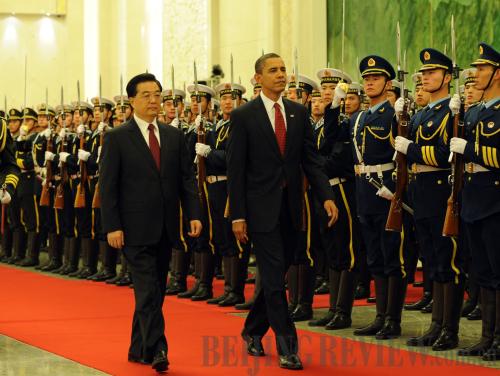|
 |
|
GUEST OF HONOR: Visiting U.S. President Barack Obama views honor guards along with Chinese President Hu Jintao at the Great Hall of the People in Beijing on November 17 (LI TAO) |
China and the United States adopted three joint communiqués in 1972, 1979 and 1982 respectively as charter documents for their diplomatic relations. Issued during the Cold War, these joint communiqués mainly discussed bilateral issues including sovereignty and territorial security, as well as certain regional issues, Yang said.
The joint statement released during Obama's visit to China, however, transcended bilateral relations to involve matters of concern to the international community such as economic recovery, nuclear non-proliferation, climate change and the environment. It not only addressed current issues but also charted the course for a future China-U.S. relationship with worldwide implications, he added.
"Both sides have agreed to strengthen dialogue, communication and cooperation from a strategic and far-sighted perspective…so as to promote global peace, stability and prosperity," said Chinese President Hu Jintao at a joint press conference with Obama in Beijing after their meeting.
People to people
Obama kicked off his first state visit to China in the country's financial and economic hub, Shanghai, where he held a "town hall" meeting with more than 500 Chinese students. The one-hour discussion, during which Obama took questions ranging from antiterrorism to recipes for success with his signature charisma, was broadcast live on the websites of both China's Xinhua News Agency and the White House.
He stressed that young people could help build bridges in U.S.-China cooperation—a process that he said must grow beyond the two countries' governments to take root in the people.
In Shanghai, Obama experienced China's diversity and eagerness to embrace new ideas, said Jin Canrong, Associate Dean of the School of International Studies at Renmin University of China. The U.S. president caught a glimpse of time-honored Chinese culture by visiting the Forbidden City and the Great Wall in Beijing, he added.
In his view, the tour helped Obama gain a more nuanced understanding of China with which he will put China in a more prominent place in his strategic agenda.
Apart from enhancing mutual trust, the visit produced some concrete results as well, Jin noted. For example, the United States has pledged to send 100,000 students to China over the coming four years. Nearly 100,000 Chinese are now studying in the United States, whereas the United States has about 20,000 students in China, according to the joint statement.
China and the United States have also signed a document on establishing a clean energy research center, with headquarters in each country. Both agreed to split its funding of at least $150 million over five years evenly between the two countries.
Meanwhile, the United States responded to China's major political concerns during Obama's visit, Jin said. Washington welcomes the peaceful development of relations across the Taiwan Straits, the joint statement said.
It likewise looks forward to efforts by both sides to increase dialogues and interactions, and develop more positive and stable cross-Straits relations, it added.
The United States and China, according to the statement, underlined that each country and its people have the right to choose their own paths, and that all countries must respect each other's choice of a development model.
Lingering disputes
Zhou Shijian, a senior fellow at the Research Center for China-U.S. Relations at Tsinghua University in Beijing, felt "a little disappointed" by Obama's visit.
An expert on China-U.S. trade relations, Zhou told Beijing Review that Obama neglected to address China's economic concerns such as trade protectionism, China's market economy status, U.S. restrictions on hi-tech exports to China and pressures for the Chinese currency to appreciate.
| 